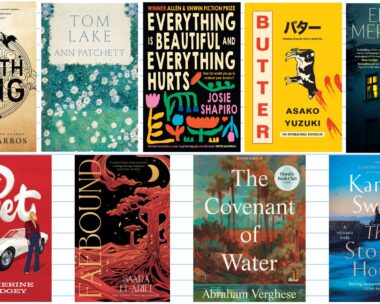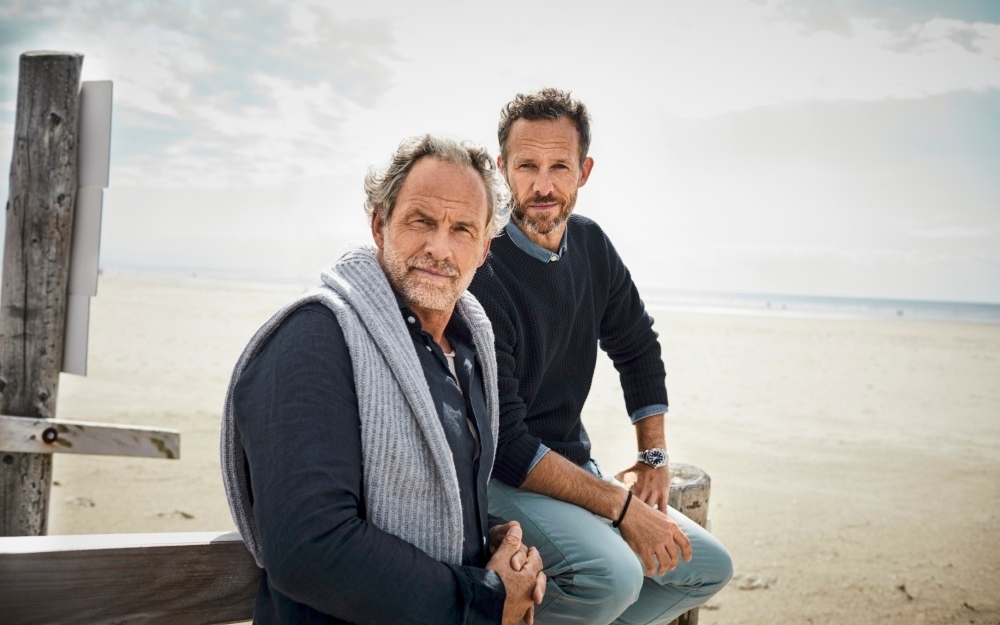Open books open minds: literature is a gateway to compassion, hope, love, understanding, epiphany and empowerment. It lets us live a thousand lives not our own, walk in the shoes of strangers, and allows us as individuals to tap into the vastness of human experience and discovery — all from the comfort of a favourite chair.
But when does reading move from a personal pastime to a shared experience?
Katherine Mansfield is quoted as once saying: “The pleasure of all reading is doubled when one lives with another who shares the same books”. Presumably this is because you have someone you can talk to about what you’ve just read — someone who ‘gets it’, or perhaps ‘got something else’ from the same text; something you’d never have seen if it weren’t for them sharing their perspective.

Members of New Zealand’s largest network of organised book clubs would agree with Mansfield on this one:
“I love how we can all read the same words and have a completely different experience,” – Rae, Christchurch
“The more I did not like a book and then listen to everyone else’s comments, the more I am surprised at what I did not originally appreciate when I first read it.” – Jess, Auckland
So, according to the clubs, what are some of the best books to get you talking, thinking and even acting on what you’ve read? Let’s get to the list!
Stories from New Zealand
Where the Rēkohu Bone Sings (Fiction)
Tina Makareti
From the 19th century invasion of Rēkohu (Chatham Islands) through to contemporary Aotearoa, this is the story of a truly New Zealand family: Moriori, Māori, and Pākehā.
In order to have a life together, Mere and Iraia, star-crossed lovers with irreconcilable differences in status, must leave their home in the 1880s Marlborough Sounds and start afresh in Wellington. A century later, fraternal twins Lula and Bigs, born with Māori and Pākeha heritage will have their own demons to grapple with — and binding them all together, an ancestral voice.
Bringing to light a neglected part of NZ history, and tackling the challenge of fluid identity, this is a unique and satisfying read from an author with a unique multicultural perspective.
“We had one of our best discussions as a group. Three of our group even read Michael King’s Moriori for a better understanding of the Moriori people.” – Group convenor, Wellington
“I was a bit anxious before the meeting as I had really enjoyed it and appreciated its historical aspects and story, but didn’t know what the others would think. But they were unanimous in their praise…The cultural aspects and the way different people feel about the makeup of their own families formed part of our discussion. A great book, we thought, and one we would definitely encourage other groups to read.” – Marian, Owaka

The Good Doctor (Non-fiction)
Lance O’Sullivan
This autobiography doesn’t just give the reader an inspiring personal story but also cogent analysis of New Zealand’s health-related social issues.
Benefit-raised by a solo Pākehā mother, and struggling with the absence of his Māori father, Lance O’Sullivan was despised on all sides. Life could have gone either way for him: Two of his secondary school teachers expected him to end up in jail, but he eventually connected with his Māori heritage, found key mentors, and went on to study medicine.
Lance has since been acknowledged as Kiwibank New Zealander of the Year, a Sir Peter Blake Emerging Leader, Public Health Champion, and Māori of the Year. With a passion and commitment to those who are disadvantaged, particularly Māori in Northland, he exemplifies the book’s subtitle: breaking the rules, making a difference.
“Every member of our group enjoyed this book. We were full of admiration for Lance’s work in the north and his innovative ideas. Some members had an issue with the quality of the writing and editing, [but] our discussion was epic! It was the liveliest discussion/debate on any book in our 15-year history!” – Group convenor, Nelson
“Our most memorable meeting was the discussion after reading The Good Doctor. We spent a lot of time talking about [NZ’s] current health system and its inadequacies — especially with appointments only being a quarter hour in length. We also talked about our own personal needs and shared what changes we may need to make in future.” – Julie, Picton

Bulibasha (Fiction)
Witi Ihimaera
The story of two rival Māori families, the Mahanas and the Poatas, who clash constantly in sport, kapa haka competitions, and finally in the inaugural Golden Fleece Shearing Contest.
Narrated by 15-year-old Simeon, grandson of Tamihana (known as Bulibasha, a Gypsy word for ‘King of Gypsies’), and set in a time when society was beginning to change and teenagers were pushing against traditional boundaries, a powerful patriarch’s long-held beliefs and control over the family are challenged.
The setting of 1950s rural New Zealand is vividly depicted and the characters richly portrayed. The book encompasses several universal themes: love, loyalty, jealousy, deceit and dislocation, interwoven by some brilliant humor — including a bunch of raunchy aunts, and three transvestite cousins who temporarily join the family hockey team.
A movie adaptation directed by Lee Tamahori and starring Temuera Morrison, Mahana, was released in 2016.
“What a great book! Everyone loved it! Now we are up for a DVD night to watch Mahana. With his humour and descriptive writing skill, you can almost smell the sheep in the woolshed! Just wonderful.” – Group convenor, Taupo
“The group thoroughly enjoyed the book. We had a stimulating discussion around underlying themes of the book i.e. Māori mythology, family structures.” – Group convenor, Culverden

Stories from a different time
The Boys in the Boat (Non-fiction)
Daniel James Brown
Who would have imagined it — trounced by a university rowing team! At the 1936 Olympic Games in Berlin, a crew of young American lads won gold, defeating the German team who were expected to win. This is the story of these working-class boys, particularly young Joe Rantz who rises from adversity to participate in this triumphant event.
Capturing the difficult economic and social conditions in the US at the time, and the rise of Nazism in Europe, this is a moving and inspiring piece of history given full rein in this detailed story.
“This [book] exceeded all our expectations…several [members] said it is not normally a book they would have chosen so were delighted! A truly great story.” – Group convenor, Christchurch*
“This was interesting! We all groaned when we first saw this book: “Who chose that?” However, nearly all of us thoroughly enjoyed this book…Amazingly clear description of life in the 1930s…We learnt a lot about rowing, USA, the Depression, 1936 Olympics, and pre-war Germany — most of all, human resilience!” – Group convenor, Cromwell

The Handmaid’s Tale (Fiction)
Margaret Atwood
Written in 1987, The Handmaid’s Tale is often praised for being ‘ahead of its time’ as it expertly describes a dystopian future where the world has radically changed. Offred, the handmaid, learns how to survive in the repressive, post-holocaust Republic of Gilead. Ominous references to the ‘time before’ point to present-day society.
Now a hit TV series, The Handmaid’s Tale proves to be still relevant and topical in today’s society — over three decades since it was written.
“Simple to read yet difficult to digest, this book polarised our group, but we all found it fascinating and it provoked intense discussion. How would we respond as women in that situation? Could something like that happen in New Zealand?” – Group convenor, Auckland
“Whew! What an imagination, and such insight….We really tore this one to bits. We didn’t ‘enjoy’ it as such, but it really made us think.” – Group convenor, Murchison

A Gentleman in Moscow (Fiction)
Amor Towles
The book opens in 1922 Russia after the Revolution. Our protagonist, 32-year-old Count Alexander Rostov, is sentenced by a Bolshevik Tribunal to house arrest in a luxury hotel — for the crime of being born privileged. He spends the next three decades in the hotel, his room being a small attic. We see hotel life, and Russian history through his eyes. Truly a lesson in how to play the hand you’ve been dealt.
This book has a bit of everything: Aristocracy, 20th Century Russian history, romance, politics, espionage, a collection of colourful characters…and a very charming Count.
“The hostess [of our meeting] provided a Russian afternoon tea, as well as leading a very good discussion. Not all had enjoyed the book, but found the discussion helpful in showing them aspects of the book which they had not recognised before.” – Group convenor, Wellington
“Our group loved this book. The author writes beautifully and brings the witty Count of a bygone era to life effortlessly. We discussed the political parallels that could be drawn between the Russian Revolution and current events like Brexit and the 2016 US election and how the various characters embodied different political ideals. Most captivating though is the way the Count’s interior life develops: the love, friendship and losses — and the pursuit of meaning in a world that inevitably moves on.” – Renee, Christchurch
Stories from another place
The Girl with Seven Names (Non-fiction)
Hyeonseo Lee
What were you doing when you were seventeen? North Korean defector Hyeonseo Lee was escaping over the border into China. Disillusioned by the Great Famine of 1990, Hyeonseo sought a better life but it came with the cost of continual subterfuge and reinvention. First to China, then South Korea, then a return twelve years later to the Chinese border to smuggle out her mother and brother, this courageous and difficult journey is underpinned by Hyeonseo’s strength and determination.
Both a dramatic and powerful personal story and a unique insight into life under the repressive North Korean regime, this is also an inspiring testimony to what people will risk for freedom.
“Everyone was shocked by the plight of ordinary North Koreans. The book profoundly touched us all, albeit in different ways, as each of us was affected by different parts of the story. We all agreed that we were better people for having read it.” – Debbie, Christchurch
“We all enjoyed this thought-provoking book that opened our minds to life inside North Korea. It generated some great discussion about culture, politics and living in foreign countries. Well worth the read. Definitely recommend.” – Group convenor, Tauranga

Find me Unafraid (Non-fiction)
Kennedy Odede & Jessica Posner
Growing up homeless in Kibera, a slum in Kenya, Kennedy Odede received a book of Martin Luther King’s speeches that changed his life and inspired him to start Shining Hope for Communities (SHOFCO), a local youth group. Several years later, irrepressible Wesleyan student Jessica Posner travelled to Kenya to work with SHOFCO. Soon, she and Kennedy fell in love. After returning to Wesleyan, Jessica discovered that Kennedy was threatened by political violence. She helped him escape by convincing Wesleyan’s admissions committee to offer him a full scholarship.
Once they’d finished college, Kennedy and Jessica returned to Kibera to found a school for hundreds of its most vulnerable residents: girls, and are determined to improve the lives of countless more.
Tender and inspiring, Find Me Unafraid vividly illustrates the power we all have to impact the world, and stands as a testament to the transformations made possible by true love.
“Our whole group felt this was one of the most memorable and inspiring books we have read for a long time. We were so amazed and excited about SHOFCO and the fact that Kenny & Jessica are still very involved with its existing and future projects that we are looking to make a financial contribution to their cause.” – Group convenor, Feilding

Cutting for Stone (Fiction)
Abraham Verghese
Marion and Shiva Stone are twin brothers born of a secret union between a beautiful Indian nun and a brash Orthopaedic surgeon. Orphaned by their mother’s death and their father’s disappearance, bound together by a preternatural connection and a shared fascination with medicine, the twins come of age as Ethiopia hovers on the brink of revolution.
Moving from Addis Ababa to New York City and back again, Cutting for Stone is an unforgettable story of love and betrayal, medicine and ordinary miracles, and two brothers whose fates are forever intertwined.
“We had an enthralling discussion as several of our members are doctors’ wives. Their husbands have been thinking more and more that bedside medicine is very important, and that their training was lacking emphasis on empathy and sensitivity.” – Group convernor, Richmond
“What a great story! We loved it! We now know so much more about life in Ethiopia, and I’m sure we could now do an operation or two – the detail was amazing.” – Group convenor, Masterton

Stories for a lighter (but still topical) read
The Universe Versus Alex Woods (Fiction)
Gavin Extence
This warm and engaging story is rich with humour, moral conflicts and intriguing characters.
In Alex Wood’s short life, there have been two major life-altering events, and it’s hard to say which will have the most effect: being hit on the head by a meteorite when he was ten, or, as a teenager, meeting his elderly reclusive neighbour Isaac Peterson while trying to evade the latest crop of school bullies. The unlikely friendship that develops gives Alex the sounding board he needs to sort out his philosophy on life…and death. Astrophysics and neurology feature in this reckoning, as do God, Kurt Vonnegut and the vexed issue of assisted suicide.
“Our group had a very open and frank discussion around the topic of euthanasia which is timely with NZ’s upcoming referendum on the issue.” – Lesley, Christchurch
“We all loved it; clever, funny and quirky read. Some members even thought it was the best book we’d had for several years! And, of course, discussion on the various issues it raised followed at length.” – Group convenor, Auckland

The Song Collector (Fiction)
Natasha Solomons
It takes the obnoxious antics of composer Harry Fox-Talbot’s young grandson Robin to set Fox on the road to recovery. Recently widowed, he has been languishing, bereft without his wife Edie. But Robin, it turns out, is a musical prodigy and as his talent emerges, so too does Fox’s interest in life. He starts composing again and is finally able to confront the long-standing family schism that began decades earlier when Edie was first introduced to the Fox-Talbot clan.
Threaded with wry humour and with a passion for music at its core, this gently written story of love, betrayal and yearning will captivate you to its very last note.
“An easy read and enjoyed very much by most of the group. All agreed that it was beautifully descriptive with very clever observations of life in rural England at that point. The characters, even minor ones, were well drawn, with a gentle storyline that was believable. Some of us wanted more loose ends tied up, but accepted that they were actually superfluous to the main strands of the story. Lots of discussion as to whether NZ has similar songs that should be collected and what made them special to us.” – Group convenor, Tauranga
“Our group loved this book. The themes of music, country life, literature, folk song collecting and Jewish hardship really resonated, and made for good discussion.” – Group convenor, Whakatane

Eleanor Oliphant is Completely Fine (Fiction)
Gail Honeyman
Themes of loneliness, depression and self-harm are portrayed through the eccentric and lovable character of Eleanor, a 29-year-old Glaswegian accounting clerk. Eleanor ekes out an existence clinging to a destructive routine of work, supermarket pizza and two bottles of vodka, but truly begins to heal thanks to the help of human connections which help her to confront a troubled past.
“Everyone at the meeting really enjoyed this book, 5 stars definitely. All characters (apart from [Eleanor’s] mother) were very much people we could identify with in our own connections with family and friends. There was…a realisation of how people can be so lonely even though they have regular contact with their workmates and neighbours.” (Group convenor, Christchurch)
“We all loved/enjoyed/wept/laughed/connected with Eleanor in so many ways! Which of course resulted in a marvellously entertaining discussion, definitely one for everyone.” – Group convenor, Nelson
“This book was enjoyed by the group and we are recommending it to others. Created discussion about loneliness in the modern world, and how people/workplaces treat each other/staff. Very good read.” – Group convenor, Gore
Groups surveyed for this article are all members of Book Discussion Scheme (BDS), New Zealand’s only nationwide book club specialist. If you would like to learn more about how to start a book club, you can request a free information pack at www.bds.org.nz/jointheclub




